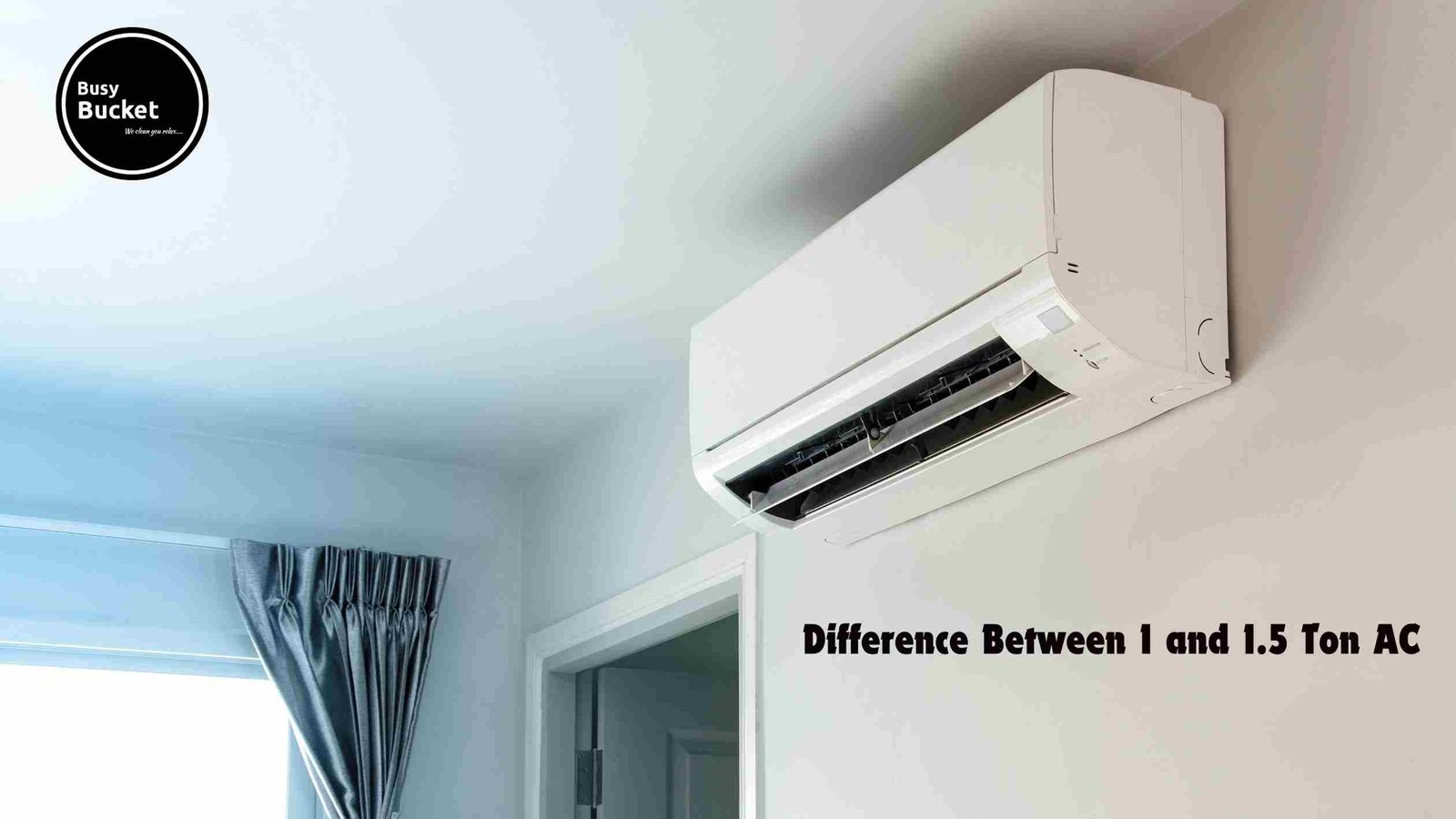What Does “Ton” Mean in ACs?
In air conditioners, the term “ton” doesn’t refer to its cooling capacity. It measures how much heat the AC can remove from a room in an hour. Specifically, one ton of cooling equals the ability to cool 12,000 BTUs (British Thermal Units) per hour.
So, a 1-ton AC can remove 12,000 BTUs of heat each hour, while a 1.5-ton AC can remove 18,000 BTUs per hour. The higher the tonnage, the more cooling power the AC has.
This means a higher-tonnage AC can cool larger spaces more effectively, making it crucial to choose the right AC for your room size.
Cooling Capacity of 1 Ton and 1.5 Ton AC:
The main difference between a 1-ton and a 1.5-ton AC is how much cooling power they have, which affects the size of the room they can cool.
- 1 Ton AC is best for smaller rooms up to 150 square feet, such as bedrooms, small living rooms, or study rooms.
- 1.5 Ton AC: Perfect for medium-sized rooms between 150 and 250 square feet, such as larger bedrooms, small offices, or medium-sized living rooms.
It’s essential to choose the right size AC for your room. A bigger AC can cool the room more efficiently and use less energy. A too-big AC will cool the room too fast without removing enough humidity, making it feel damp and uncomfortable.
Visit- Window AC Services in Chandigarh
Energy Consumption of 1 Ton and 1.5 Ton AC:
Energy consumption is another important factor to consider. Generally, a 1.5-ton AC consumes more power than a 1-ton AC due to its higher cooling capacity.
However, modern ACs come with energy efficiency ratings, such as the Bureau of Energy Efficiency (BEE) star ratings in India, which indicate how efficiently an AC unit operates.
- 1 Ton AC: Consumes less power, making it more energy-efficient for smaller spaces. It typically has a lower operating cost.
- 1.5 Ton AC: Consumes more power, but it may be more energy-efficient for larger spaces as it can cool the area more effectively and quickly.
When comparing energy consumption, it’s essential to consider the Energy Efficiency Ratio or Seasonal Energy Efficiency Ratio of the units. A higher rating indicates better energy efficiency.
Difference between Cost in 1 Ton and 1.5 Ton Air Condition:
When it comes to cost, 1-ton and 1.5-ton air conditioners have some noticeable differences.
- One-ton AC: Generally, it has a lower initial purchase price than a 1.5-ton AC. This makes it a more budget-friendly option if you’re looking to cool a smaller room. Additionally, because it uses less power, a one-ton AC will also have lower electricity bills, saving you money in the long run.
- 1.5-ton AC: It costs more upfront because it’s designed to cool larger spaces. It also consumes more electricity, so your monthly energy bills will be higher compared to using a 1-ton AC. However, if you have a medium-sized room, the extra cost might be worth it for better cooling performance and comfort.
Choosing the right AC based on your room size can help you balance the initial cost and long-term energy expenses. It can also be beneficial to pick the proper AC as needed.
Which Makes More Noise: 1 Ton AC or 1.5 Ton AC?
Noise levels can also vary between 1-ton and 1.5-ton AC units. Larger units often have bigger compressors and fans, which might generate more noise. However, advancements in AC technology have led to quieter models across all capacities. When choosing an AC, consider the noise level (measured in decibels) specified by the manufacturer.
Suitability for Different Climates for Both Air Conditions:
When choosing between a 1-ton and a 1.5-ton air conditioner, the climate where you live matters.
In hotter climates, where temperatures regularly soar, a 1.5-ton AC is often the better choice, even for small rooms. Its stronger cooling power can handle the intense heat and keep your room comfortable.
In milder climates, where temperatures are not extremely high, a 1-ton AC can be more than enough for smaller to medium-sized rooms. It provides efficient cooling without using too much power, saving you money on electricity.
If your area experiences varying temperatures, consider the size of your room and how hot it gets. A 1-ton AC might work well for small spaces, while a 1.5-ton AC is ideal for medium to larger rooms. This will ensure you stay cool and comfortable no matter the weather.
Visit- AC Service in Chandigarh
Conclusion on 1 Ton AC and 1.5 Ton AC
The difference between 1 ton and 1.5-ton AC units primarily lies in their cooling capacity and cost. When choosing between a 1—and 1.5-ton AC, consider the size of your room and your budget. By Considering these points, you can select the suitable AC unit that meets your cooling needs and provides optimal comfort.
Frequently Asked Questions
What size room can a 1-ton AC cool?
A one-ton AC is suitable for rooms up to 150 square feet, including small bedrooms, study rooms, or small living rooms.
How much does a 1.5-ton AC cost compared to a 1-ton AC?
A 1.5-ton AC generally costs more and uses more electricity compared to a 1-ton AC. However, it provides better cooling for larger rooms, making it worth the extra expense in the right setting.
Is a 1-ton AC more energy-efficient than a 1.5-ton AC?
Yes, a 1-ton AC is typically more energy-efficient for smaller rooms, as it consumes less electricity. For larger rooms, though, a 1.5-ton AC is more efficient as it cools the space more effectively and quickly.
Can I use a one-ton AC in a larger room?
Using a one-ton AC in a larger room (over 150 square feet) is not recommended. The AC will need help cooling the space efficiently, leading to higher energy consumption and inadequate cooling, which will make the room less comfortable.
Does climate affect which AC tonnage I should choose?
Yes, in hotter climates, a higher-tonnage AC, like a 1.5-ton, is better for effective cooling. In milder climates, a 1-ton AC can suffice for smaller to medium rooms, providing efficient cooling without extra cost.


